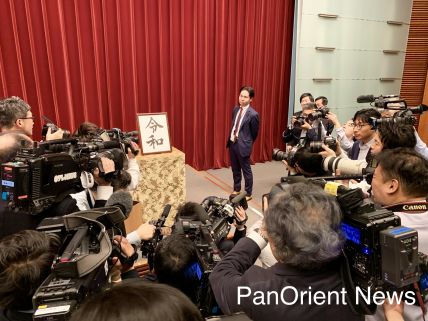|
|
Diplomacy
Japan’s Abe Explains REIWA, New Imperial Era Name
Saturday, April 6, 2019

Tokyo- (PanOrient News) Japanese Prime Minister Shinzo Abe explained the long-awaited name of Japan’s next imperial era in a statement on April 1 by quoting the poetry anthology the name Reiwa was taken from.
“‘In this auspicious month of early spring, the weather is fine and the wind gentle. The plum blossoms open like powder before a mirror while the orchids give off the sweet scent of a sachet,’” quoted Abe from the “Manyoshu”—the oldest poetry anthology in Japan.
He added that the name Reiwa “includes the meaning of culture coming into being and flourishing when people bring their hearts and minds together in a beautiful manner.”
Japan’s new Reiwa Era will officially begin after the new emperor ascends to the throne on May 1, following the abdication of the current Emperor Akihito due to age and health concerns. The transition will mark the first time a living emperor has stepped down in over 200 years.
“History from time immemorial, highly respectable culture, and natural beauty unique to each of our four seasons. We will pass down these national characteristics of Japan firmly to the next era,” said Abe. “Just as the plum blossoms announce the arrival of spring after the harsh cold of winter and bloom splendidly in all their glory, all Japanese will be able to make their own blossoms come into full bloom, together with their hopes for tomorrow.
“We decided on ‘Reiwa’ with the hope that Japan will be just such a nation. On peaceful days when we can foster culture and appreciate natural beauty, full of heartfelt gratitude, we will together with the Japanese people carve out a new era that is brimming with hope.”
Abe noted that the poems in the “Manyoshu” were penned by authors from a wide range of social strata, from emperors down to soldiers and farmers, and said it symbolized Japan’s rich national culture and long-established traditions.
The name Reiwa constitutes two Japanese characters and translates roughly to “beautiful harmony.” Because Japanese often refer to years by imperial eras instead of the more international Gregorian calendar, especially on documents, the era name does come up in daily life and the announcement of the new period was much-anticipated.
“Era names have, together with the long-standing tradition of the Imperial Household and a profound wish for the peace and security of the nation and the well-being of the people, woven together the history of our nation that spans almost 1,400 years,” said Abe. “Era names are also integrated into the hearts and minds of the Japanese and support the Japanese people’s inner sense of unity.”
“It is my sincere wish that this new era will also be widely accepted by the public and take root deeply within the daily lives of the Japanese people,” he concluded.
© PanOrient News All Rights Reserved.
|
|

